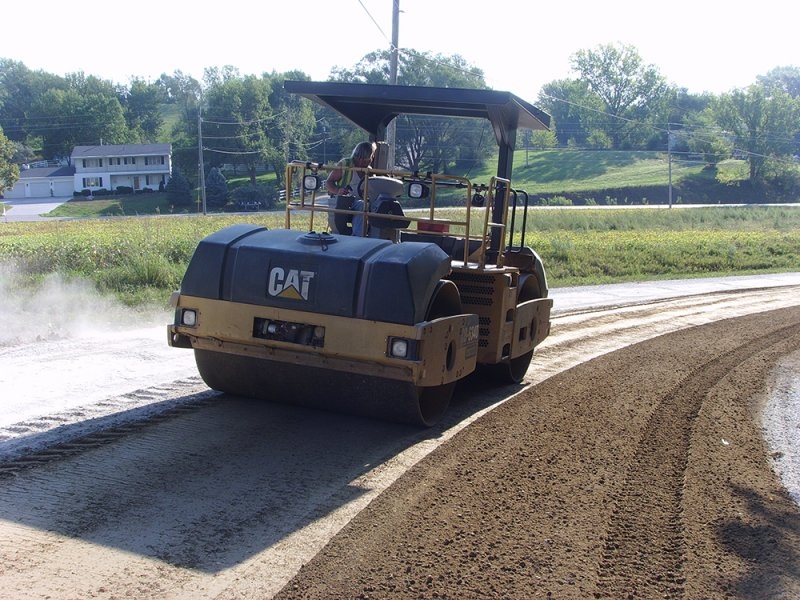
Earthbind® products are environmentally-friendly, bio-based modified asphalt emulsions and are designed to control fugitive dust (Earthbind® 100), stabilize road base materials (Earthbind® Stabilizer), and to recycle reclaimed asphalt pavement and alternative paving (Earthbind® EBS- RA).
Earthbind® products are engineered and manufactured by EnviRoad, LLC in Portland, Oregon. Earthbind® products can be cost-effective, environmentally-safe substitute for asphalt cutbacks.
Background – Asphalt Cutbacks
Certain asphalt cutbacks have been formally or currently (in limited use), as dust control agents. Asphalt cutbacks are formulated with petroleum solvents and asphalt cements. The petroleum solvents (also called distillates, diluents, or cutter stock) are for dissolving the solid or semi-solid asphalt cement for application purposes.
- There are three types of asphalt cutbacks: rapid curing (RC), medium curing (MC), and slow curing (SC). These cutbacks are named for their rate of curing. Their curing rates are based on the type of petroleum solvent used. For example:
Rapid curing asphalt cutbacks are formulated with light diluents of high volatility, generally in the gasoline or naphtha boiling point range. The rapid curing cutbacks include RC-70, RC-250, RC-800, and RC-3000. Rapid setting grades are designed to cure quickly and are primarily used for spray applications such as bond tech coats, aggregate chip seal, and sand sales and similar surface treatments; - Medium curing asphalt cutbacks are made from diluents of intermediate volatility generally in the kerosene boiling point range. The medium curing asphalt cutbacks include MC-30, MC-70, MC-250, MC-800, and MC-3000. Medium setting asphalt cutbacks are intended for mixing with aggregates; and
- Slow curing asphalt cutbacks are formulated with petroleum oils of low volatility generally. The slow curing asphalt cements include SC-70, SC-250, SC-800, and SC-3000. Slow curing cutback asphalts are often called road oils and are used primarily in road mixing, prime coats and dust control.
Asphalt cutbacks are rarely used today for dust control. This is due to increasing environmental regulations and concerns. The use of cutback asphalts has been significantly restricted or even prohibited in many parts of the United States.
Earthbind® Products
Earthbind® 00, Earthbind® Stabilizer, and Earthbind® EBS-RA were developed as a cost- effective and environmentally-safe alternative for cutback asphalts when used for dust control, prime coats, and recycling reclaimed asphalt pavement/alternative paving.
Summary – Earthbind® vs. Asphalt Cutbacks
- Asphalt cutbacks are formulated with petroleum solvents and are not considered to be environmentally-friendly. In contrast, Earthbind® does not contain any organic solvents. Earthbind® is considered to be environmentally-friendly.
- Earthbind® 100 was developed in part to provide an alternative to asphalt cutback. Earthbind® does not contain any solvents, naphtha, jet fuel, kerosene, diesel or other volatile compounds that were, traditionally used to “cut” through the dirt and allow the asphalt to stick to the rock.
- Earthbind® 100 is uniquely formulated with proprietary ingredients. Earthbind® 100 is one of a kind; no other traditional or modified bitumen emulsion is comparable in chemistry and binding capabilities.
- Earthbind® 100 is specifically made to be a dust suppressant. Traditional asphalt emulsions and cutbacks are mainly made for paving related construction projects instead.
- Asphalt cutbacks such as MC-30, due to the organic solvent, has a longer curing time when compared to Earthbind® MC-30 usually requires at least 3-days to cure whereas Earthbind® can cure in as little as several hours.
- Asphalt cutbacks such as MC-30 can potentially degrade the asphalt pavement applied on top of the prime coat due to the evaporation of the solvent used as the cutter.
- Earthbind® 100 is formulated and engineered to be different, Earthbind® 100 is not considered to be like or the same as the traditional asphalt emulsions which include the “slow sets”, (SS-1, CSS-1, etc.), “medium sets” (MS), “rapid sets” (RS), “quick set” (QS) or “HF emulsions” (HF).
- Earthbind® 100’s base materials are specially chosen and engineered (e.g., viscosity, penetration, etc.) to infiltrate and adequately coat and bond soil particles and aggregates together specifically for dust suppression.
- Earthbind® 100 can be used on “dusty” and off-spec aggregate when compared to standard asphalt emulsions. When using standard asphalt emulsions, aggregates typically must be clean (washed) to ensure binding.
- Earthbind® 100’s chemistry is non-ionic compared to typical asphalt emulsions that are mostly either cationic or anionic. Therefore, Earthbind® can bind will all types of soil and aggregates regardless of their ionic charge.
- Earthbind® 100 concentrate can freeze without breaking or altering the product performance. Standard asphalt emulsions will break when exposed to freezing temperatures.

